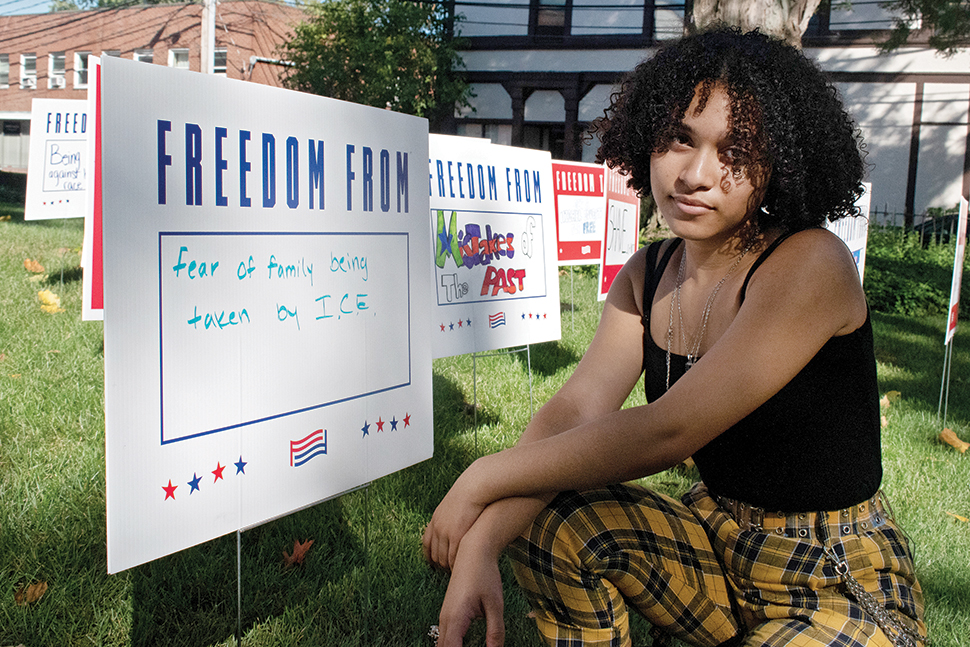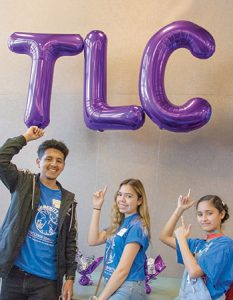Let Them Lead

Black Lives Matter (BLM) demonstrations—renewed by the death of George Floyd in the custody of Minneapolis police—may be the largest social movement in US history, according to a recent New York Times analysis. Half a million people turned out at 550 sites across the country at the protests’ peak on June 6. And many of the movement’s supporters are young people: This past summer, high school students organized and led BLM protests in California, Maryland, Michigan, Texas, and other states.
This isn’t the first time in recent years that teens have taken a visible role in public protests. Many of them marched in support of the DREAM Act and spoke out about immigration policy; advocated for gun control after the 2018 mass shooting at Marjory Stoneman Douglas High School in Parkland, Florida; and followed environmental activist Greta Thunberg’s lead in organizing school strikes to bring attention to the climate crisis. Some librarians are using these galvanizing moments to engage teens around issues that matter to them. In the context of national and international social justice movements, libraries are helping teens develop and amplify their voices and build awareness of matters affecting their communities.
Donnell Washington, senior library assistant at Charlotte Mecklenburg (N.C.) Library (CML), thinks the library is a natural place for teens to develop both answers to societal problems and the skills to implement them. He was inspired by the teens he encountered while protesting with his local BLM group, as well as his prior experience working with youth in the nonprofit sector.
“My biggest thing is to create that atmosphere to engage and empower them to come up with solutions,” Washington says. “A public library has the ability and the power to do that.”
While participating in BLM demonstrations, Washington came up with the idea to hold a teen summit at the library that would highlight issues relevant to youth. He reached out to seven of his colleagues working in teen services departments across the CML system to get the ball rolling, then brought in the library’s VolunTeens, a group of volunteers ages 13–17, to help shape the program’s content.
Washington and stakeholders created the Better Hope for Tomorrow virtual summit and four accompanying weekly town hall events, with the aim of covering topics such as race, discrimination, immigration, ability, mental health, gender identity and sexuality, and interactions with police for a largely teen audience. Six panel experts—three adults in relevant human-service fields and three teen activists passionate about tackling social inequalities—were invited to the summit. Following the conference, teens will be invited to attend monthly workshops and discuss solutions to the issues addressed by the program, Washington says.
“If we’re talking about allowing their voices to be heard, you have to allow them to speak and listen,” he says. “As adults, let’s pull back. Our teens are intelligent enough to have the conversations.”
Start with dialogue
Jennifer Johnson, who works with teens as a forum manager and library services coordinator at two locations of York County (Pa.) Libraries—one rural and one urban—says that BLM has made a universal impact on the youth in her area.
“I had understood the interests of the teens at both locations to be quite different,” says Johnson. “Since the BLM demonstrations, I’m finding their interests are weaving together. Both sets of teens are interested in supporting social justice issues.”
To better support their concerns, she interviewed two local teens who had, independent of the library, organized a successful peaceful demonstration in the area.
“I wanted to find out what advice they had for me. It was a huge learning experience,” she says. “The group I’m working with doesn’t want to organize a protest, [but] they want to address some of their perceptions of the issues at the heart of the BLM [movement].”
Right now the group is meeting weekly over Zoom to decide how to move forward with its initial ideas and develop them into action. Johnson stressed that the teens would shape the progression of the project, which they’ve decided to call “Recognize Me.” They also met with one of the teen BLM organizers as well as a member of a local borough council to discuss conflict resolution in the community.
As adults, let’s pull back. Our teens are intelligent enough to have the conversations.—Donnell Washington, senior library assistant at Charlotte Mecklenburg (N.C.) Library
Opening a dialogue with youth patrons can spark programming around social justice, says Virginia A. Walter, professor emeritus at UCLA and author of Young Activists and the Public Library (ALA Editions, 2020). She was inspired to write her book by experiences on the job as far back as the 1960s, including discussions she had with teens while working at a neighborhood branch of Los Angeles Public Library (LAPL).
“They cared about so many things, but really didn’t have—as I didn’t at that age—an idea of what they could do,” Walter says. “They love being able to talk to adults about things that matter. Kids are hungry for that; they just don’t [often] have the opportunity.”
She recommends libraries turn to their teen forums or other influential teens in the community to get started.
“I think every community has a different way that this can happen,” she says. “Be open to listening. Both children and teens are eager for a sympathetic adult to talk to. I think that’s more valued than we know.”
Social justice programming helps teens develop real-world skills, community connections, and confidence in translating their opinions into actions. Libraries can play a key role in this development.
“The kids have firsthand experience with a lot of these issues,” Walter says. “One of the key ingredients in this is a sense of efficacy. That’s something that a library can be involved with.”
Teens in charge
In addition to making space for conversations, librarians say involving teens in decision making and execution is key to success. Teens respond more when their peers drive ideas and fill leadership roles.
“We try to make everything as teen-led as possible,” says Luke Kirkland, teen department head at Waltham (Mass.) Public Library (WPL), who helps facilitate regular discussions in the library’s teen room. “I’m like a human footnote/bouncer/moderator. It almost always goes better for the participants, the audience, when other teens are involved. It’s so much more interesting when they’re running it.”
WPL hosts an array of regular events for young people that connect them to social justice issues. Twice a month, teens gather in a dedicated space for a forum called Real Talk. Led by high schoolers, it’s considered the centerpiece of the library’s teen programming.
The mission of Real Talk, which was founded in 2016 by a local teen named Rachel Cosgrove, is to help youth develop their own voices within a social and emotional learning environment where they can explore issues affecting their community. The first iteration of the group drew 30–40 teens.
“There was a spirit of risk-taking and an honest desire to have serious conversations,” says Kirkland.
“I think it really starts with trust and relationships,” he adds. “Youth are not going to have honest conversations with people they don’t trust. It has to start there.”
Occasionally, WPL invites community guests—but only those who can really engage young people—to present on social justice issues or hold special interactive events, such as a game show on teen sexual health. Real Talk meetings involve a lot of collaborative elements and movement.
“These topics can get very loud,” he says. “If you want an active teen life in your library, you have to defend that type of usage in your library from people who would criticize it.”
As a result of Real Talk, WPL has developed projects based on participants’ experiences and interests. Before the 2018 midterm elections, the library partnered with civic organization For Freedoms and local art group Blueprint Projects to create yard signs based on teens’ responses to fill-in-the-blank prompts: freedom of…, freedom to…, freedom for…, and freedom from….
“With teens who don’t get to vote, it’s an opportunity for the adults in town to get a sense of what the concerns of youth are,” Kirkland says.
Responses demonstrated teens’ acute sensitivity to social, economic, and political issues, with slogans such as:
- Freedom to have more teachers of color in my school.
- Freedom from the fear of having my family taken away.
- Freedom from men having to act masculine.
- Freedom to have a disability without being stared at.
- Freedom from a future defined by the effects of climate change.
After staffers collected responses from teens, their messages were printed on double-sided signs and displayed on the library’s lawn through Election Day. WPL held an event in which the mayor, local representatives, and the public were invited to view the signs. During the event, which included a voter registration drive, teens mingled with attendees, quizzing them with questions from the US citizenship test. Teens also delivered speeches to the assembled audience, underscoring the importance of leaders listening to youth voices in shaping community policies.
 Photo: Los Angeles Public Library” width=”233″ height=”300″ srcset=”https://temilib.nasniconsultants.com/wp-content/uploads/2020/11/let-them-lead-1.jpg 233w, https://temilib.nasniconsultants.com/wp-content/uploads/2020/11/let-them-lead-4.jpg 350w” sizes=”(max-width: 233px) 100vw, 233px”>
Photo: Los Angeles Public Library” width=”233″ height=”300″ srcset=”https://temilib.nasniconsultants.com/wp-content/uploads/2020/11/let-them-lead-1.jpg 233w, https://temilib.nasniconsultants.com/wp-content/uploads/2020/11/let-them-lead-4.jpg 350w” sizes=”(max-width: 233px) 100vw, 233px”>“That kind of platform to speak to representatives—that was really cool for them,” Kirkland says. “[To] a lot of students, it feels like adults aren’t asking them about issues.”
The first year, WPL produced 100 yard signs for the For Freedoms project; the second year, they doubled that number. They hope to recruit other libraries to participate and to continue the program virtually amid the pandemic. Additionally, WPL has created online resources, including modules and activity guides for Real Talk, to help other libraries start similar programs.
Kirkland says teens often believe they don’t have the depth of knowledge or confidence to voice their opinions on the issues of the day.
“You have a teen, who’s like: ‘I’m not political. I don’t go to protests. I don’t know what to say,’” he says. “If you engage them, you’re able to draw out a story from their life that has community political implications.”
From ideas to actions
In Los Angeles, youth are tackling issues in their communities via Teenagers Leading Change (TLC), a program that helps young people across LAPL branches develop the ability to turn ideas into actions. Created by Candice Mack, LAPL’s managing librarian of systemwide teen services and 2015–2016 president of the Young Adult Library Services Association, the program was started as a way to attract library foundation funding for teen services while engaging young people in civic projects.
“So far we’ve had 26 projects across 33 branches and 362 teens participating,” says Mack, who launched the program in 2017 after pitching it for several years.
LAPL’s program helps clarify the issues teens care about and move their ideas into research, community engagement, and implementation phases. The initiative has addressed topics such as media literacy, eviction and displacement, homelessness, and voting rights. Past projects saw teens hosting a tenants’ rights day at the library, compiling an oral history of Los Angeles’ Little Tokyo neighborhood, and creating a mural with an environmental justice theme.
Mack says one thing LAPL has learned from the project is that YA librarians need training and support to have the kind of conversations with youth that lead to social justice projects.
“Our staffers have the heart to do it, but some of those conversations are heavy discussions,” she says. LAPL has since held systemwide facilitation trainings for YA librarians, most recently in August with the library’s newly hired curriculum designer.
Mack believes any library can adopt a version of TLC that meets its needs and helps teens develop their skills for activism.
“We hope that things like this can be duplicated in other communities. I think [what we do] can definitely be scaffolded up or down,” she says. “The more teens and youth doing awesome things in their communities, the better.”
Source of Article